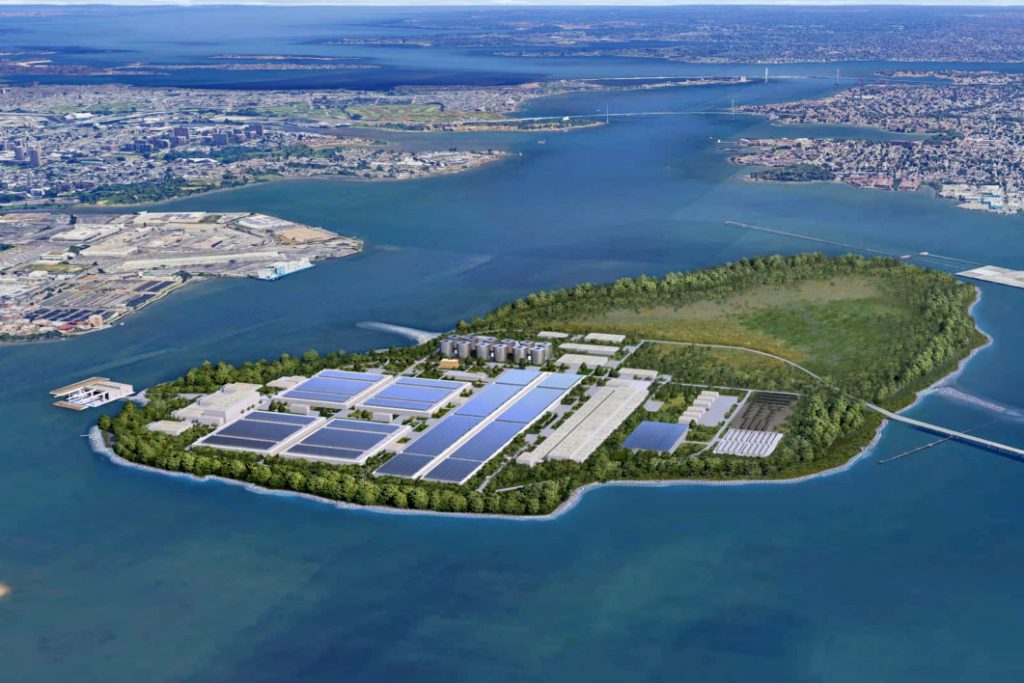City officials will have to produce a masterplan to convert Rikers Island into a green haven by the end of 2026, if a bill set to be introduced in the City Council on Thursday becomes law.
The legislation, being sponsored by Councilmembers Sandy Nurse (D-Brooklyn) and Jennifer Gutiérrez (D-Brooklyn/Queens) is an attempt to force action from Mayor Eric Adams, who has been reluctant to carry out the previous administration’s renewable-energy plans for the island.
Because of a bill passed in 2019, the city must close the 10 jail facilities on Rikers Island by August 2027 and replace them with four jails closer to courthouses in each borough except Staten Island.
But that goal is way off schedule and Adams has repeatedly talked about a “Plan B,” as the number of people locked up continues to rise during his tenure.
Currently, the new jail in Downtown Brooklyn is set to be complete in 2029, the lockup in The Bronx is slated to open in 2031, and the jail in Queens is scheduled for 2032, according to Zachary Katznelson, executive director of theIndependent Rikers Commission.
A new jail to replace the old one in lower Manhattan has no timeline as City Hall struggles to find a new design firm, according to city records.
City officials are also trying to physically firm up Chung Pak, a low-income senior residence in Manhattan, located right next to the former jail known as The Tombs. Some cracks were spotted on the apartment building during the demolition of the notorious detention center.
In 2021, former Mayor Bill de Blasio signed a package of bills that “requires the Office of Sustainability to study the feasibility of constructing renewable energy sources, which could include wind or solar power, and battery storage facilities on Rikers Island.”
But the Renewable Rikers Act doesn’t definitively mandate that the land has to be used for green energy purposes, only that the idea be researched. So, as the shutdown Rikers plan slowly progresses, there are plenty of other ideas for what to do with the 413-acre island by the East River.
Some want to build affordable housing or a gigantic park. Others, like former Gov. Andrew Cuomo, want it to be used as an expanded runway for LaGuardia Airport.
Nurse, chair of the City Council Committee on Criminal Justice, and co-sponsor Council Member Jennifer Gutiérrez, seek to end the debate — and lock in the green Rikers plan.
“We are moving forward,” she told THE CITY on Wednesday. “We know that it’s possible. We have all the justification for why we need renewable energy.”
She contends the city should not be building any housing on a Rikers, a former landfill which can only be accessed via a narrow bridge from Queens.
“It’s very clear that we should not be housing people on the island for a number of other public health reasons,” she said. “And this is what we’re doing — and we need to see a concrete plan with resources that we could put behind it for construction of this infrastructure that’s going to benefit the city of New York.”
Concepts and Plans
On Thursday, Nurse plans to introduce a bill that would require city officials to develop a so-called master plan for Renewable Rikers.
The plan would have to include what it would entail to build a wastewater treatment plant, renewable energy generation and storage and off-shore converter stations.
The Department of Citywide Administrative Services, which oversees city property, would take the lead. But the Department of Environmental Protection and other municipal agencies would also be involved, according to Nurse.
The master plan would include a cost estimate and possible timeline for each new green project, under the proposed legislation.
The broad outline of the Renewable Rikers plan is feasible, according to prior reports.
In March, two city entities published reports ordered up by the City Council declaring it feasible to build a new wastewater treatment plant on the island, along with solar, battery storage and new equipment to feed offshore wind power into the electric grid.
Environmental activists back the proposed bill.
“This is the logical next step in bringing to life the promise of the 2021 Renewable Rikers legislation to convert this island into a model of environmental progress, green jobs and social justice,” said Eric Goldstein, a senior attorney for the Natural Resources Defense Council who is also a member of the Rikers Island Advisory Committee.
But the Rikers closure is also dependent on the city reducing the jail population to around 4,200. There are currently 6,525 people locked up on Rikers as of Sept. 10, according to city records. By contrast, some 4,751 were in jail when Adams took office in January 2022.
Renewable Rikers had appeared to be at a near standstill since it was enacted into law more than three years ago by de Blasio.
Under Adams, the Department of Correction has not turned over unused facilities to the Department of Citywide Administrative Services, as required under the law, and an advisory group meant to plan for the post-jail future of the island skipped required meetings.
But Nurse is optimistic that the master plan bill — which would need to be signed by Adams or passed by a veto-proof two-thirds majority of the Council — will supercharge the initiative and end the debate for how the island should be used when the jails finally shutter.
“Now we need to make a real plan,” she said, “not just the concept that this is what we should do.”

